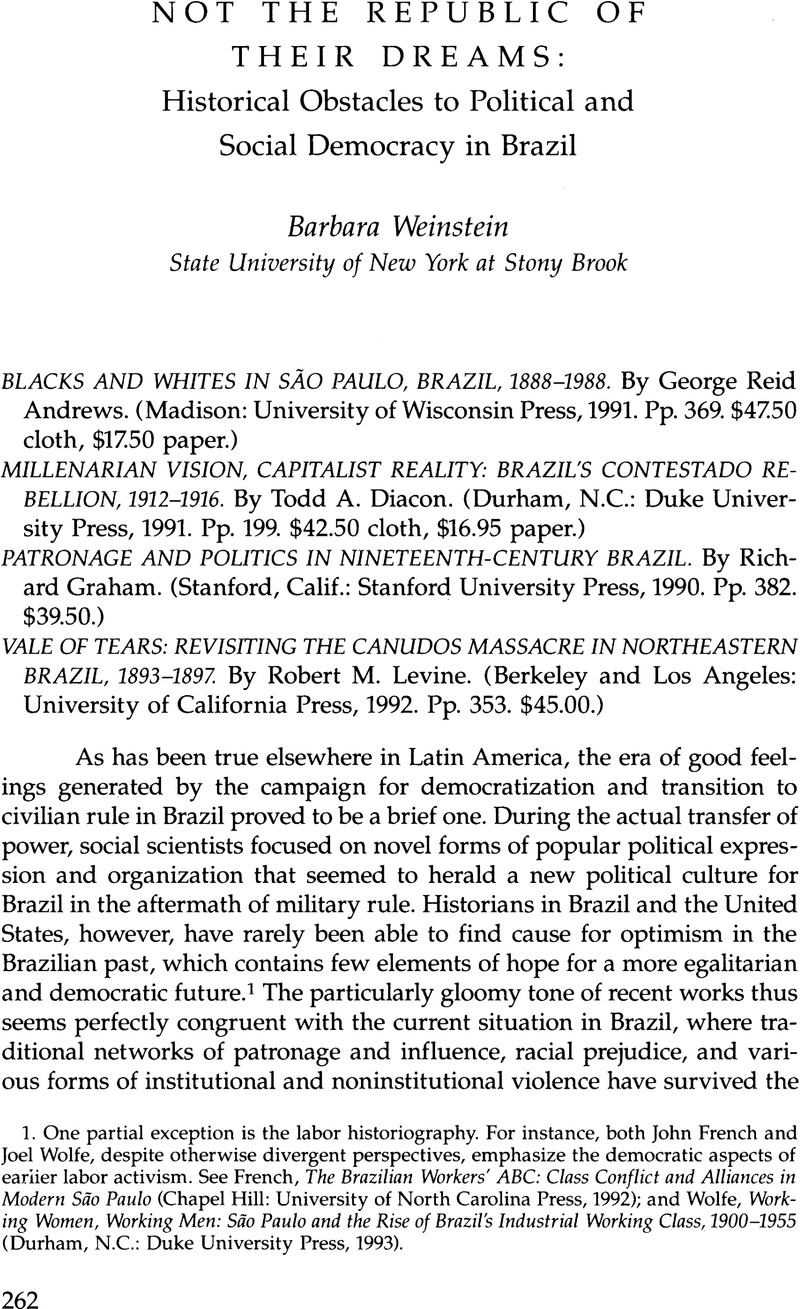Published online by Cambridge University Press: 05 October 2022

1. One partial exception is the labor historiography. For instance, both John French and Joel Wolfe, despite otherwise divergent perspectives, emphasize the democratic aspects of earlier labor activism. See French, The Brazilian Workers' ABC: Class Conflict and Alliances in Modern São Paulo (Chapel Hill: University of North Carolina Press, 1992); and Wolfe, Working Women, Working Men: São Paulo and the Rise of Brazil's Industrial Working Class, 1900–1955 (Durham, N.C.: Duke University Press, 1993).
2. The most influential examples are Luiz Werneck Vianna, Liberalismo e Sindicato no Brasil (Rio de Janeiro: Paz e Terra, 1976); Marilena Chauí, “Apontamentos para uma Crítica da Ação Integralista Brasileira,” in Chauí and M. S. Carvalho Franco, Ideologia e Mobilização Popular (Rio de Janeiro: Paz e Terra, 1978), 17–149; and Edgar Salvadori de Decca, 1930: O Silêncio dos Vencidos (São Paulo: Brasiliense, 1981).
3. José Murilo de Carvalho's works include A Construção da Ordem: A Elite Política Imperial (Rio de Janeiro: Campus, 1980); Os Bestializados: O Rio de Janeiro e a República que Não Foi (São Paulo: Companhia das Letras, 1987); Teatro de Sombras: A Política Imperial (Rio de Janeiro: IUPERJ/Vértice, 1988); A Formação das Almas: O Imaginário da República no Brasil (São Paulo: Companhia das Letras, 1990).
4. Attributed to Martinho Prado da Silva Júnior (1891), in Murilo de Carvalho, A Formação das Almas, 52. Even more severe was the judgment pronounced by Alberto Torres two decades later: “This State has no nationality; this country is not a society; these people are not a populace. Our men are not citizens.” Ibid., 33.
5. In Os Bestializados, Murilo de Carvalho contends that with the transition to the First Republic, “one can say that there was even a regression in the realm of social rights,” and that the so-called republican reforms “had the result of delivering power even more directly into the hands of the dominant sectors” (p. 45).
6. A leading text in the Brazilian literary canon, da Cunha's Os Sertões was published in English translation as Rebellion in the Backlands, translated by Samuel Putnam (Chicago, Ill.: University of Chicago Press, 1944). More recently, Canudos has been subjected to the literary imagination of Mario Vargas Llosa in The War of the End of the World, translated by Helen R. Lane (New York: Farrar, Straus and Giroux, 1984).
7. I am referring here to David Koresh and the Branch Davidians. Despite substantial differences between the two incidents, the threat posed by the cult in Waco, Texas (however unsavory its practices might have been) also seems insufficient to explain in purely “rational” terms why the state adopted a strategy that was likely to leave many dead, including young children.
8. Diacon's argument about the spiritual role of the patron follows closely the earlier work of Patricia Pessar. See “When Prophecy Prevails: A Study of Millenarianism in Brazil,” Ph.D. diss., University of Chicago, 1976; and “Unmasking the Politics of Religion: The Case of Brazilian Millenarianism,” Journal of Latin American Lore 7, no. 2 (1981):255–78.
9. Distinguished Brazilian sociologist Florestan Fernandes, who pioneered the study of racial discrimination in Brazil, argued that the experience of slavery left the former slaves with deficiencies that made them unable to compete with immigrants in a “free” labor market. See Fernandes, The Negro in Brazilian Society (New York: Columbia University Press, 1969), 10–12, 52–53.
10. For further details on political activity within the Afro-Brazilian community during the post-emancipation period, see Kim D. Butler, “Up from Slavery: Afro-Brazilian Activism in São Paulo, Brazil, 1888–1938,” The Americas 49, no. 2 (Oct. 1992):179–206.
11. On the origins and evolution of the “one-drop rule” in the United States, see F James Davis, Who Is Black? (University Park, Pa.: Pennsylvania State University Press, 1991).
12. In several of her essays, Emília Viotti da Costa has explored the impact of patronage on imperial political and intellectual life. See The Brazilian Empire: Myths and Histories (Chicago, Ill.: University of Chicago Press, 1985).
13. For a stimulating comparative discussion, historical and contemporary, of patron-client relations in Brazil and Mexico, see Luis Roniger, Hierarchy and Trust in Modern Mexico and Brazil (New York: Praeger, 1990).
14. For a highly provocative discussion of personal influence and its role in devaluing the status of citizen in Brazilian society, see Roberto da Matta, “The Quest for Citizenship in a Relational Universe,” in State and Society in Brazil, edited by John D. Wirth et al. (Boulder, Colo.: Westview, 1987), 307–35.